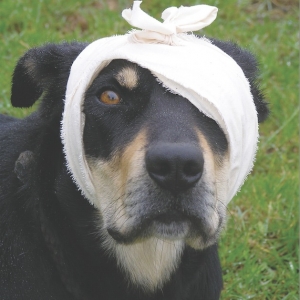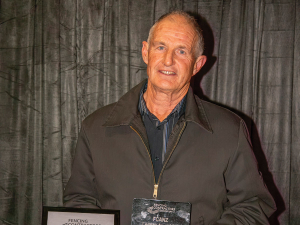Who should pay?
Although I have never owned a farm and employed staff, I can see why some owners choose not to pay any expenses related to staff’s dogs, apart from food.
After all, if you are handling stock you need your own dogs; they are tools of the trade that you provide, so you care for them on a day-to-day basis and pay for vet expenses when needed. Agreed?
Why should a farm pay if people neglect their dog’s welfare or take unnecessary risks when working their dogs, putting them in danger. Then there are the brutes out there that beat and torture their dogs, inflicting broken bones and many other physical injuries. They may adamantly claim their dog was kicked by a cow.
Supposedly if a dog owner pays he will be more diligent with his dogs. Put like this it is easy to understand the reasoning behind a farm not paying.
However, many farm workers will disagree and I understand their plight. Genuine injuries occur to working dogs that handle stock: it is a dangerous occupation for man and canine. The dog is injured whilst working; it’s no one’s fault; why can’t the farm pay the vet bill?
And where do you draw the line? A few stitches and some antibiotics are a cheap investment but broken bones, ripped tendons, etc, soon clock up the dollars, often exceeding the value of the dog.
Who should pay for Parvovirus vaccinations? Having given this a lot of thought lately I now believe the dog owner should pay. Staff often come and go, along with their dogs; you can never be sure who vaccinates their dogs, and which properties have had a problem in the past with the virus.
Due to it being deadly, easily transferred, and staying in the ground for years before attacking vulnerable dogs, it should be every dog owner’s responsibility to safeguard his dogs; it should not be a farm’s responsibility.
Please tell new staff, before they arrive on the property, if you have ever had a dog die there of Parvo. I heard recently of a young shepherd, new to dogs, who wasn’t told there had been an outbreak of Parvo at his house and kennels a few months previously. He nearly lost a prized pup. It is the responsibility of a farm owner or manager to inform new staff so they can have their vaccinations up to date.
Something interesting: a few months ago I was appalled at the cost of having two heading pups vaccinated with their first shot, so much so that I rang eight vet clinics in different areas. The cost to vaccinate one pup with its first Parvo-only vaccine ranged from $38 to $72.
The subject of working dog expenses should be bought up at interviews and everything made clear regarding what will and will not be provided, to prospective employees. It really is a tough one; dogs are valuable (but not valuable enough) and vet fees for surgery are terrifying.
Looking back over the years I recall some dog tucker, some horse shoeing and some hay; I say some because some places provided and some didn’t. I remember paying the vet bills. And I remember a meagre allowance for wet weather gear, dog, horse and saddlery.
• Anna Holland is teaching people dog training. For more information www.annaholland.co.nz or Ph 07) 217 0101 or This email address is being protected from spambots. You need JavaScript enabled to view it.

















